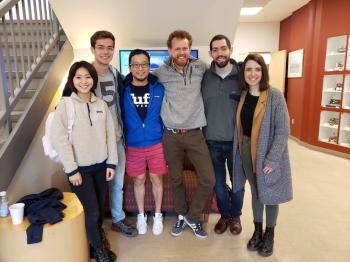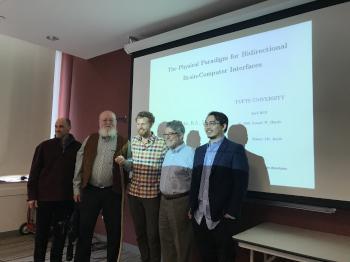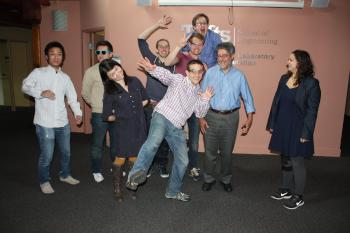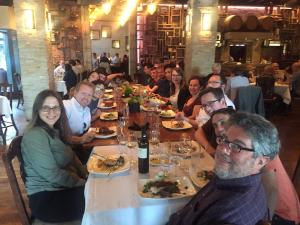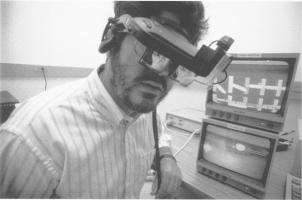Rob Jacob

Robert J.K. Jacob
Dept. of Computer Science
Tufts University
Halligan Hall
177 College Avenue
Medford, MA 02155 U.S.A.
(He/him)
Email: 
WWW: http://www.cs.tufts.edu/~jacob/
Office: Cummings 357
Phone: 617-627-2225
Fax: 617-627-2227
The HCI lab is in the Joyce Cummings Center at 177 College Avenue. The lab is on the third floor, room 362.
Office Hours:
Normally Wednesdays, 3 p.m.
Background
Robert Jacob is a Professor of Computer Science at Tufts University, where his research interests are new interaction modes and techniques and user interface software; his current work focuses on implicit brain-computer interfaces. He has been a visiting professor at the University College London Interaction Centre, Universite Paris-Sud, and the MIT Media Laboratory. Before coming to Tufts, he was in the Human-Computer Interaction Lab at the Naval Research Laboratory. He received his Ph.D. from Johns Hopkins University, and he is a member of the editorial board for the journal Human-Computer Interaction and a founding member for ACM Transactions on Computer-Human Interaction. He has served as Vice-President of ACM SIGCHI, Papers Co-Chair of the CHI and UIST conferences, and General Co-Chair of UIST and TEI. He was elected as a member of the ACM CHI Academy in 2007 and as an ACM Fellow in 2016.
Current Research: Implicit Brain-Computer Interfaces
The current focus in my research group is on
a new generation of "implicit" brain-computer interfaces.
They allow a computer to obtain and act on auxiliary inputs from its user
without requiring explicit user action or attention.
Brain-computer interaction has made dramatic progress,
but its main application to date has been for physically
disabled users. Our
work in real-time measurement and machine learning
classification of functional near infrared spectroscopy (fNIRS) brain
data is allows to create, use, and study
new kinds of implicit user interfaces based on brain measurement.
We are using brain input as a way to obtain more
information about the user and their context in an effortless and
direct way from their brain activity.
We then use it to adapt the user interface in real time.
We are creating and studying
these new user interfaces, with emphasis on domains where we can measure their efficacy.
We are now also broadening this work to include other forms of lightweight,
passive, real-time adaptive implicit interaction,
based on physiological or other measurements.
Our focus continues to be on the
design of subtle and effective implicit interfaces
that make judicious use of the measurements we can obtain.
[General article]
[Overview chapter]
[More papers]



Papers, Talks, News
- Papers with links to electronic versions of recent ones
- Talks and other presentations
- Professional activities
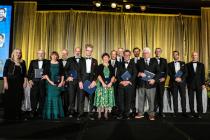
- Inducted as ACM Fellow 2016
- Gave opening keynote at First Neuroadaptive Technology Conference NAT'17, Berlin, 2017
- CHI 2016 paper on brain-computer interaction for music learning by Beste Yuksel et al. received Best Paper Award.
- Beste Yuksel's research on music learning reported in
New Scientist
- IEEE Computer Special Issue on Physiological Computing,
with Erin Solovey as guest co-editor, published October 2015
[Editors' introducton]
[Contents]
[Audio interview]
- Research featured in the Boston Globe (March 3, 2014),
The Times (London),
New York Post,
and elsewhere.
- Video and article about our research featured in
Tufts Now,
also on WBUR's Radio Boston
and CCTV America
- CHI 2014 paper on brain-computer interaction by Dan Afergan et al. received Best Paper Honorable Mention Award.
- Dan Afergan's research on brain-computer interfaces reported in
New Scientist
- Evan Peck's research on brain-computer interfaces reported in
New Scientist,
ACM Tech News,
and
Discovery News.
- CHI 2012 paper on brain-computer interaction by Erin Solovey et al. received Best Paper Honorable Mention Award.
This work was also covered by
MIT Technology Review,
extremetech.com,
and
many other places.

- Comment on future iPads in Huffington Post
- Comment on TV remote controls
- Still more comments, on the Spark radio show on CBC
[podcast; segment starts around 0:06]
[MP3, 53MB]
- Some comments on the legacy of Steve Jobs
- Mike Horn's work on tangible programming languages for children,
at the Boston Museum of Science, reported on NECN TV
- Computerworld article
[link]
discusses
Reality-Based Interaction
- Elected to ACM CHI Academy 2007
(Photo courtesy of Ben Shneiderman)
Some Previous Research Projects
Courses
Spring 2024
- CS 171 Human-Computer Interaction
Fall 2023
- CS 86 Object-Oriented Programming for Graphical User Interfaces
Ph.D. Alumni
- Sam Hincks, Spatial musician and AI consultant
- Beste Yuksel, University of San Francisco
- Dan Afergan, Google Inc.
- Evan Peck, University of Colorado Boulder
- Erin Solovey, Worcester Polytechnic Institute
- Audrey Girouard, Carleton University
- Leanne Hirshfield, University of Colorado Boulder
- Michael Horn, Northwestern University
- Michael Poor, Baylor University
- Orit Shaer, Wellesley College
- Georgios Christou, European University Cyprus
- Horn-yeu Shiaw, HCI Inc.
- Vildan Tanriverdi, IBM
- Leon Deligiannidis, Wentworth Institute of Technology
- Stephen Morrison, Intersystems
Some Links
Ridiculous bio from chatgpt, for amusement purposes only, don't believe this
Robert J.K. Jacob is a distinguished computer scientist and researcher renowned for his pioneering work in the field of human-computer interaction (HCI) and computer graphics. Throughout his illustrious career, he has contributed significantly to advancing the way humans interact with computers and digital systems.
Dr. Jacob serves as a Professor of Computer Science at Tufts University, where he has been an influential faculty member. His research has delved into a wide range of topics, including user interfaces, interactive systems, virtual reality, and innovative input devices. His work has not only pushed the boundaries of technology but has also greatly impacted the user experience and usability of digital applications.
With a passion for bridging the gap between humans and computers, Robert J.K. Jacob has published numerous influential research papers and co-authored several seminal books on HCI and interaction techniques. His expertise has been sought after by academia and industry alike, making him a respected figure in both realms.
Dr. Jacob's dedication to the field has earned him accolades and recognition within the computer science community. His contributions have helped shape the way we interact with technology and have paved the way for future advancements in HCI.










